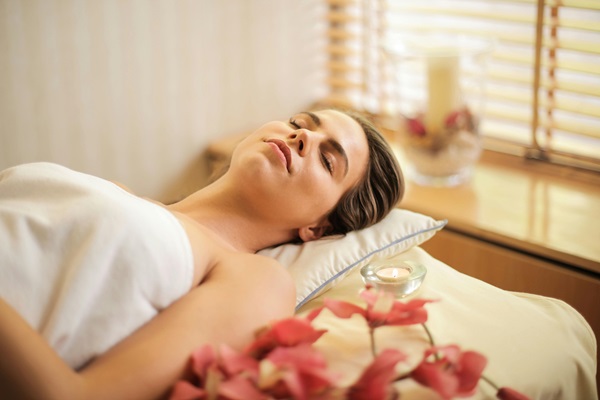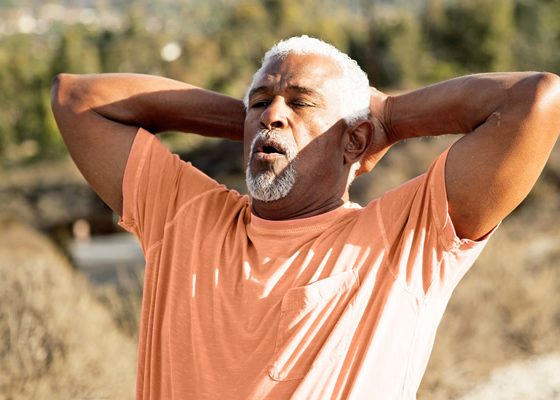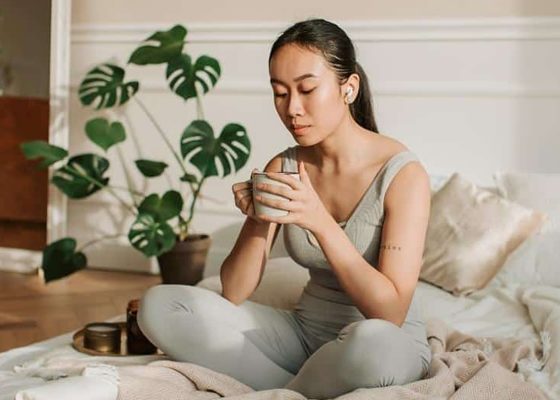Imagine a life where stress and anxiety are not your constant companions, where physical and mental well-being is not an elusive dream. In today’s fast-paced world, such a life may seem unattainable, but it’s within reach. Relaxation is the key to unlocking this well-being, a powerful tool that can transform your life. This comprehensive article takes you on a journey through the benefits of relaxation, exploring its significance, science, and the myriad techniques that can help you achieve a state of equilibrium and serenity.

Introduction
In a world characterized by relentless demands and pressures, self-care is no longer a luxury but a necessity. Self-care, at its core, entails the deliberate practice of activities that promote your physical, mental, and emotional health. Relaxation is at the heart of self-care, a fundamental element in achieving and maintaining well-being.
The Significance of Self-Care
Self-care isn’t about self-indulgence; it’s about preserving and enhancing your physical, mental, and emotional health. It’s the acknowledgment that you deserve to be taken care of, just like anyone else. In the chaos of life, it’s the lifeboat that keeps you afloat.
The Role of Relaxation in Well-being
Enter relaxation, the unsung hero of self-care. This article aims to uncover the profound role that relaxation plays in well-being. It’s not just about kicking back on a Sunday afternoon; it’s about actively managing your physical and mental health, and it’s about time we explore the science behind this powerful tool.
The Physiology of Relaxation
Relaxation isn’t just a state of mind; it’s a state of being that has a profound impact on your body. At the heart of this transformation is the autonomic nervous system, a complex network of nerves that governs involuntary bodily functions.
Understanding the Autonomic Nervous System
The autonomic nervous system is a silent conductor of your bodily orchestra. Divided into two branches, the sympathetic and the parasympathetic, it regulates your heart rate, breathing, digestion, and more. The sympathetic branch revs you up, preparing you for action, while the parasympathetic branch brings calm and restoration. Understanding this system is crucial to understanding the benefits of relaxation.
The Science of the “Relaxation Response”
The body has a built-in mechanism for relaxation, often referred to as the “relaxation response.” This response is the antidote to the stress response. When activated, it promotes physical and mental rejuvenation, leading to a state of profound relaxation.
Hormonal Benefits of Relaxation
Your body’s hormonal system is intricately tied to your mental and emotional well-being. Relaxation techniques can influence hormone levels, which, in turn, impact your mood, stress levels, and overall health. The science behind these hormonal changes is fascinating and underscores the real, tangible benefits of relaxation.
Mental Benefits of Relaxation
Beyond physiology, relaxation offers a plethora of cognitive and emotional benefits. It’s not just about unwinding; it’s about resetting your mind, reducing anxiety, and enhancing your mental faculties.
Reducing Anxiety and Stress
Relaxation is a formidable weapon against chronic stress and anxiety. It’s the pause button in the high-speed chase of life. By inducing relaxation, you can significantly reduce anxiety, restore emotional equilibrium, and improve your overall well-being.
Enhancing Cognitive Function
Relaxation isn’t just about a temporary escape; it’s about sharpening your mental faculties. Relaxed states of mind enhance cognitive function, leading to improved problem-solving and decision-making abilities. The mind becomes a more efficient and creative machine.
Boosting Creativity and Problem-Solving
Have you ever wondered why your best ideas often come when you’re relaxed, like in the shower or during a leisurely walk? Relaxation liberates your mind to explore new pathways and connections, fostering creativity and innovative problem-solving.
Physical Benefits of Relaxation
Relaxation is not confined to your mind; it extends its soothing embrace to your body. The physical benefits of relaxation are nothing short of remarkable.
Lowering Blood Pressure and Heart Rate
One of the most tangible benefits is the effect of relaxation on cardiovascular health. Regular relaxation techniques contribute to decreased blood pressure and heart rate, which, in turn, reduce the risk of cardiovascular problems. Your heart is happier when you’re relaxed.
Muscle Relaxation and Pain Relief
Have you ever noticed how your muscles tense up when you’re stressed? Relaxation methods can alleviate this tension, providing relief from chronic pain conditions. It’s the body’s way of thanking you for taking a break.
Improved Immune System Function
The immune system is your body’s first line of defense against illness. A relaxed mind and body promote a strong immune system, making you better equipped to ward off infections and stay healthy. It’s not a coincidence that you’re more prone to sickness when you’re stressed.
Exploring Relaxation Techniques
Now that you understand the science and benefits of relaxation, it’s time to explore the myriad techniques that can help you embark on a journey to well-being.
Mindfulness Meditation
Mindfulness meditation is more than just a trend; it’s a scientifically validated practice that emphasizes awareness of the present moment. This technique can have profound effects on your mental well-being and emotional balance.
Progressive Muscle Relaxation
Progressive muscle relaxation is like a gentle massage for your mind and body. By systematically tensing and then relaxing muscle groups, you can induce a state of deep relaxation, easing tension and promoting tranquility.
Deep Breathing Exercises
The breath is a powerful tool for relaxation. Deep breathing exercises can calm your nervous system, reduce stress, and provide a quick and effective way to achieve a state of relaxation.
Yoga and Tai Chi
Yoga and Tai Chi are ancient practices that combine physical postures, breathing exercises, and meditation. These practices not only enhance physical flexibility but also promote mental serenity and emotional well-being.
Nature-Based Relaxation
The natural world has an innate ability to induce relaxation. Spending time in nature, known as “ecotherapy,” can help reduce stress, improve mood, and boost overall well-being. It’s a reminder that we are intrinsically connected to the environment.
The Role of Sleep in Well-being
The relationship between relaxation and sleep is profound, as sleep is a cornerstone of well-being. Understanding this connection is vital for achieving optimal physical and mental health.
The Connection between Relaxation and Sleep
Relaxation prepares the body and mind for restful sleep. The quality and quantity of sleep are deeply intertwined with relaxation practices.
Strategies for Improving Sleep Quality
If you’ve ever struggled with sleepless nights or restless sleep, relaxation techniques can be your ally. Discover practical strategies to improve your sleep quality and awaken refreshed and rejuvenated.
Power Naps and Their Benefits
Sometimes, all you need is a quick pause to recharge. Power naps are brief, restorative breaks that can enhance alertness and productivity, further emphasizing the link between relaxation and well-being.
Balancing Relaxation and Productivity
In a world that glorifies constant productivity, it’s essential to strike a balance. Relaxation doesn’t mean laziness; it means enhancing your productivity by taking care of your well-being.
The Myth of Constant Productivity
The idea that constant productivity is the path to success is a myth. In reality, it often leads to burnout and diminished well-being. Let’s debunk this myth and explore how relaxation can lead to enhanced productivity.
Strategies for Incorporating Relaxation in a Busy Schedule
We understand that life can get hectic, and schedules can be demanding. However, there are practical ways to incorporate relaxation into your daily life, no matter how busy you are.
Creative Breaks and Their Impact on Productivity
Creative breaks, often inspired by relaxation, can be a wellspring of innovation and heightened productivity. Learn how strategic pauses can lead to breakthroughs in your work and personal projects.
Finding Your Relaxation Style
Relaxation isn’t one-size-fits-all. Your preferences, personality, and needs shape your unique relaxation style. It’s about discovering what works best for you.
Individual Preferences and Personality
Understanding your personality and what resonates with you is a key step in finding your relaxation style. Whether you’re an introvert, an extrovert, or somewhere in between, your preferences matter.
Experimenting with Different Relaxation Methods
The world of relaxation is vast, offering a multitude of techniques and practices. Don’t be afraid to experiment and find what resonates with you on a personal level.
Creating a Personalized Relaxation Routine
Once you’ve explored different methods, it’s time to create a personalized relaxation routine tailored to your needs and lifestyle. This routine becomes your sacred oasis in the busyness of life.

Overcoming Barriers to Relaxation
While relaxation is vital, various barriers can obstruct your path to well-being. Identifying and addressing these barriers is crucial.
Common Obstacles to Relaxation
Identifying the common hurdles to relaxation, such as time constraints and lifestyle pressures, is the first step in overcoming them.
Strategies for Dealing with Time Constraints
Time constraints are a prevalent obstacle to relaxation. However, there are strategies to manage time effectively and carve out moments for relaxation without overhauling your schedule.
The Importance of Setting Boundaries
Setting healthy boundaries in your personal and professional life is essential for protecting your well-being. Discover how boundaries can lead to a happier, more relaxed you.
Incorporating Relaxation into Daily Life
Consistency is the key to reaping the full benefits of relaxation. Learn how to seamlessly integrate relaxation into your daily routines and make it an indispensable part of your life.
The Significance of Consistency
A sporadic approach to relaxation won’t yield the same results as a consistent one. Explore why consistency is crucial for long-lasting well-being.
Integrating Relaxation into Daily Routines
By incorporating relaxation into daily routines, you ensure that it becomes an automatic part of your life. Discover practical ways to weave relaxation into your day seamlessly.
Creating a Relaxation-Friendly Environment
Your environment plays a vital role in your relaxation journey. It can either support or hinder your efforts. Learn how to create a nurturing space that fosters relaxation.
The Mind-Body Connection
The mind and body are not separate entities; they are deeply intertwined. The impact of stress on physical health and how relaxation fosters mind-body harmony is a pivotal aspect of well-being.
The Impact of Stress on Physical Health
Stress takes a toll on your body. Chronic stress can lead to various health issues, from cardiovascular problems to digestive disorders. Understanding this connection is the first step in mitigating its effects.
How Relaxation Fosters Mind-Body Harmony
Relaxation is the bridge that connects your mind and body. By embracing relaxation, you can restore balance and harmony to your overall well-being.
Case Studies of Individuals Who Transformed Their Well-being
Real-life stories of individuals who have embraced relaxation and self-care offer inspiration and tangible proof of the transformative power of these practices.
Self-Care and Relationships
Your well-being isn’t just a personal matter; it also influences your relationships with others. Discover how relaxation and self-care can enhance your interpersonal connections.
How Relaxation Benefits Interpersonal Relationships
When you prioritize your well-being, you become better equipped to nurture and sustain healthy relationships. The benefits of relaxation extend beyond your well-being.
Encouraging Loved Ones to Embrace Self-Care
Your journey towards well-being can inspire others to do the same. Learn how to encourage your loved ones to embrace self-care and relaxation.
Maintaining Boundaries for Well-being
Setting and maintaining boundaries is crucial for a balanced life. Explore the importance of protecting your well-being through healthy boundaries.
The Digital Age and Relaxation
In the digital age, technology and the online world can be sources of both stress and relaxation. Understanding this paradox is essential for harnessing technology to your advantage.
The Influence of Technology on Stress Levels
While technology offers many conveniences, it can also increase stress levels. Discover the factors that contribute to digital stress and its impact on your well-being.
Digital Detox Strategies for Relaxation
Digital detox strategies allow you to unplug from the digital world, offering you respite from the constant noise and demands of technology. Explore how to detox effectively and recharge your well-being.
Technology-Assisted Relaxation Tools
Technology isn’t just a source of stress; it can also be a valuable tool for relaxation. Explore the apps and devices that can support your relaxation journey.
Cultural Perspectives on Relaxation
Relaxation is a universal concept, but its interpretation and practices vary across cultures. Explore how different cultures view and practice relaxation.
Cross-Cultural Views on Relaxation
Relaxation is viewed differently across cultures. What may be considered relaxing in one culture might be stressful in another. Understanding these differences can expand your appreciation of relaxation.
Traditional Relaxation Practices Worldwide
Discover traditional relaxation practices from around the world. From Japanese forest bathing to Swedish lagom, the globe offers a rich tapestry of relaxation traditions.
How Cultural Factors Influence Relaxation Preferences
Cultural factors, including values, beliefs, and traditions, influence individual relaxation preferences. Explore how culture shapes our choices when it comes to relaxation.
The Ethics of Self-Care
In pursuing the benefits of relaxation and well-being, it’s essential to consider the ethical dimension. Balancing self-care with responsibilities and ethical considerations is part of the self-care journey.
Balancing Self-Care with Responsibilities
Self-care isn’t an excuse to shirk responsibilities; it’s about finding a balance that supports your well-being while fulfilling your obligations.
Ethical Considerations in Relaxation Choices
While self-care is essential, it’s also important to make ethical choices in your relaxation practices. Explore the moral compass that should guide your well-being journey.
The Ripple Effect of Self-Care on Society
The benefits of self-care and relaxation extend beyond the individual. They have the power to create a ripple effect, positively impacting society as a whole.
Mindful Eating and Relaxation
What you eat and how you eat can significantly impact your well-being. Mindful eating practices integrate relaxation into your relationship with food.
The Connection Between Food and Relaxation
Food and relaxation are interconnected. The way you approach food, from preparation to consumption, can be a relaxing and nourishing experience.
Mindful Eating Practices
Mindful eating encourages you to be fully present in your meal, savoring each bite. It fosters a healthier relationship with food and can enhance your overall well-being.
Nourishing the Body and Soul Through Food
Food is not just fuel; it’s a source of nourishment for both your body and soul. Learn how to make your meals a delightful, relaxing, and healthful experience.
Art, Music, and Relaxation
Art and music are not just for passive enjoyment; they can be active tools for relaxation. Discover the therapeutic power of these creative expressions.
The Therapeutic Power of Art and Music
Art and music have the power to heal and soothe the soul. Engaging with these creative forms can be a source of relaxation and emotional release.
Expressive Art as a Form of Relaxation
Creating art is not just for artists; it’s a form of self-expression that can bring relaxation and emotional relief. Explore how artistic expression can be a form of relaxation in itself.
Music Genres and Their Relaxation Potential
Music genres vary widely, and each has its unique relaxation potential. Whether you prefer classical, jazz, or ambient sounds, music can be a powerful tool for relaxation.
The Science of Happiness
Happiness is not a fleeting emotion; it’s a state of being that can be cultivated. The relationship between relaxation and happiness is a compelling one.

The Relationship Between Relaxation and Happiness
Relaxation is not just about escaping from life’s pressures; it’s about creating the conditions for happiness. Explore how relaxation can lead to a happier and more fulfilling life.
Positive Psychology and Well-being
Positive psychology is a field dedicated to the study of happiness and well-being. Delve into the principles of positive psychology and how they intersect with relaxation.
How to Cultivate Happiness Through Relaxation
Happiness isn’t an elusive dream; it’s a tangible goal. Learn practical strategies to cultivate happiness through relaxation, mindfulness, and self-care.
Measuring the Impact of Relaxation
To truly understand the benefits of relaxation, you need a way to measure its impact. This section explores different approaches to gauging how relaxation transforms your life.
Quantitative and Qualitative Approaches
Measuring the impact of relaxation requires a combination of quantitative data and qualitative insights. Discover the various methods used to assess well-being.
Self-Assessment Tools for Well-being
Self-assessment tools allow you to track your progress on your well-being journey. They provide insights into your physical, mental, and emotional health.
Long-Term Tracking of Relaxation Benefits
The benefits of relaxation accrue over time, and long-term tracking is vital for understanding the profound changes in your life. Learn how to monitor your well-being journey effectively.
The Role of Professionals
While self-care and relaxation are personal pursuits, professionals play a crucial role in guiding and supporting individuals on their well-being journeys.
Relaxation Techniques in Therapy and Counseling
Therapists and counselors often incorporate relaxation techniques into their practice to help individuals manage stress, anxiety, and other mental health concerns.
The Importance of Self-Care for Healthcare Professionals
Healthcare professionals, too, need self-care to maintain their well-being while providing care to others. Discover how healthcare professionals can find their balance through self-care.
Collaboration Between Professionals and Individuals
The collaboration between professionals and individuals is a powerful synergy that can lead to improved well-being. Professionals guide and support, while individuals actively engage in self-care.
Conclusion
As we conclude this exploration of the benefits of relaxation and its transformative power, remember that well-being is not a destination; it’s a lifelong journey. Embrace relaxation as a powerful tool to enhance your physical, mental, and emotional health.
The Enduring Relevance of Self-Care for Well-being
The need for self-care and relaxation is not a passing trend. It’s a timeless practice that remains relevant in a world filled with challenges and distractions. The benefits of relaxation is your ally on the path to a happier, healthier, and more fulfilled life.
Encouragement to Embark on a Journey of Self-Care
The journey of self-care and relaxation begins with the first step. We encourage you to embrace these practices, explore the techniques, and discover the profound impact they can have on your well-being. Your journey starts now.


